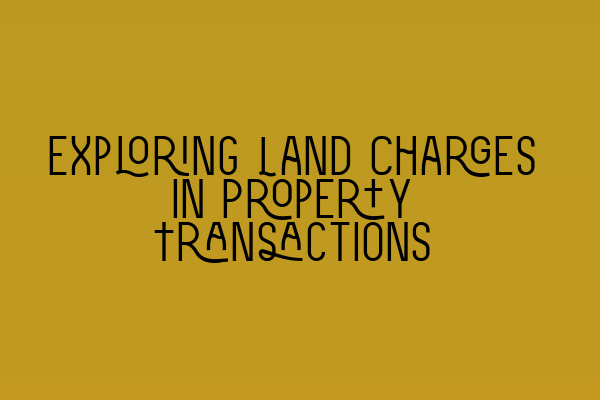**Exploring Land Charges in Property Transactions**
When it comes to property transactions, understanding the concept of land charges is crucial. Land charges refer to the various interests and restrictions that can be registered against a property. These charges serve as a form of protection for parties involved in the transaction, ensuring that their rights are safeguarded. As a solicitor specializing in property law, it is important to have a comprehensive understanding of land charges and their implications.
In this blog post, we will explore the different types of land charges and their significance in property transactions. We will also discuss the process of conducting a land charges search and the importance of this step in property transactions. So, let’s dive in!
**Types of Land Charges**
There are various types of land charges that can be registered against a property. These charges can include, but are not limited to, easements, covenants, restrictions, and leasehold interests. It is crucial to identify and understand these charges when dealing with property transactions, as they can have a significant impact on the property’s value and usage.
* Easements: Easements are rights that grant someone else the legal right to use a particular portion of the property. These can include rights of way, access to utilities, or shared driveways. Easements can be registered against the property and can affect its future use and development.
* Covenants: Covenants are legal obligations imposed on the property owner by the previous owner or a third party. These obligations can restrict the property’s usage or impose certain conditions on the owner. Covenants can vary widely and can include restrictions on alterations, limitations on property use, or maintenance responsibilities.
* Restrictions: Restrictions are similar to covenants but are usually imposed by a governmental authority or local council. These can include planning restrictions, zoning restrictions, or conservation area designations. Before entering into a property transaction, it is essential to identify and understand any existing restrictions that may affect the property.
* Leasehold Interests: In leasehold properties, the land is owned by a freeholder, and a lease is granted to the occupier (leaseholder). Leasehold interests can have a significant impact on property transactions, as they involve additional agreements and responsibilities between the landlord and tenant. Understanding the leasehold terms and any associated charges is crucial when dealing with leasehold properties.
**Conducting a Land Charges Search**
In property transactions, conducting a land charges search is crucial to identify any registered interests or restrictions on the property. This search involves examining the registers that hold information on land charges and revealing any potential issues that may affect the property’s value or usage.
The land charges search can be carried out with various authorities and organizations, including HM Land Registry, local authorities, and the Environmental Agency. These searches provide valuable information on past transactions, outstanding debts, and other charges that may affect the property.
As a solicitor handling property transactions, it is important to conduct a comprehensive land charges search to ensure that your client’s interests are protected. It is a crucial step in due diligence that can uncover potential issues that may affect the property’s value or the client’s intended use.
**Importance of Land Charges in Property Transactions**
Understanding and addressing land charges is indispensable in property transactions. Failing to identify and address land charges can result in costly issues down the line. Here are a few reasons why land charges play a vital role in property transactions:
1. **Protection of Client’s Interests**: By conducting a thorough land charges search, solicitors can identify any existing charges and advise their clients accordingly. This protects the client’s interests and ensures that they are aware of any potential restrictions or obligations associated with the property.
2. **Negotiations and Valuation**: Land charges can have a significant impact on property valuations and negotiations. It is essential to account for any existing charges when determining the property’s value and negotiating the terms of the transaction.
3. **Risk Mitigation**: Identifying and addressing land charges mitigates the risk of future disputes or legal issues. By proactively addressing potential issues, solicitors can protect their clients from unexpected liabilities or conflicts.
4. **Compliance with Regulatory Requirements**: Certain land charges, such as planning restrictions or environmental designations, may have specific regulatory requirements. By understanding these requirements, solicitors can ensure compliance and avoid potential legal consequences.
**Conclusion**
Land charges are an integral part of property transactions, and understanding their implications is crucial for solicitors practicing property law. By identifying and addressing land charges, solicitors can protect their clients’ interests, mitigate risks, and ensure compliance with regulatory requirements. Conducting a comprehensive land charges search is an essential step in due diligence, revealing any registered interests or restrictions that may affect the property’s value or usage. So, next time you handle a property transaction, remember the importance of exploring land charges and the role they play in protecting your client’s interests.
Related Articles:
– [SQE 1 Practice Exam Questions](https://fqps.co.uk/sqe/sqe1-preparation/mcq-practice-quiz)
– [SQE 1 Practice Mocks FLK1 FLK2](https://fqps.co.uk/sqe/sqe1-preparation/practice-mocks-quiz)
– [SQE 2 Preparation Courses](https://fqps.co.uk/sqe/sqe2-preparation)
– [SQE 1 Preparation Courses](https://fqps.co.uk/sqe/sqe1-preparation)
– [SRA SQE Exam Dates](https://fqps.co.uk/sqe/sqe1-sqe2-exam-dates)
